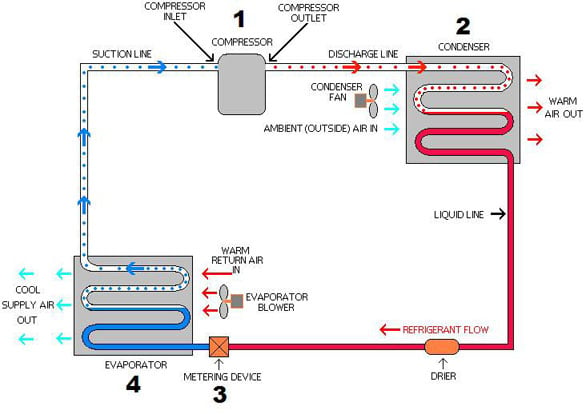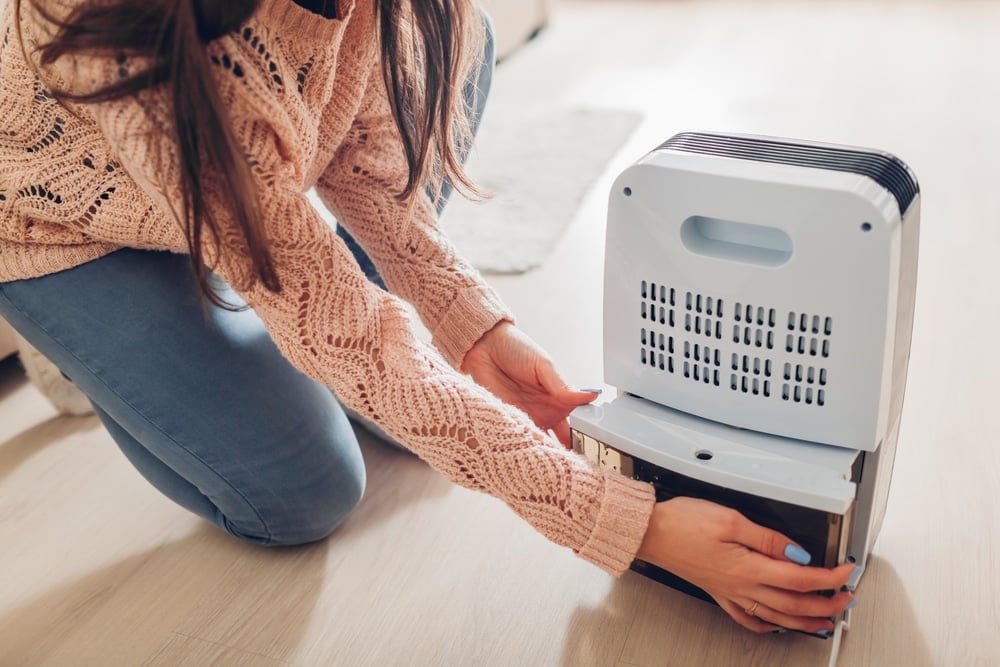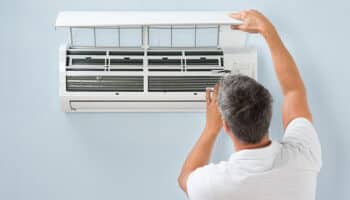We've independently reviewed this article to make sure it's as accurate as we can make it.
To find out more about our article creation and review process, check out our editorial guidelines.
Are you having a hard time comparing dehumidifiers vs air conditioners?
Unfortunately, this is a common issue. Understanding how they differ from one another can be a bit challenging because of the lack of available information.
But, the good news is that you’ve come to the right place for answers.
Air conditioners are intended to help cool the air, while dehumidifiers strip humidity. AC units often use more electricity than dehumidifiers because their job takes more work. However, if you want your home to feel cooler, both options have their benefits and drawbacks.
Ready to learn more about the differences between AC units and dehumidifiers? Keep reading.
Dehumidifier vs Air Conditioner
To help you better understand the main differences between dehumidifiers vs air conditioners, in this section, we’ll compare both across 3 categories.
#1 Operation
The main difference between dehumidifiers and air conditioners is the way they work.
First, let’s talk about how air conditioners work. Despite what you might think, they really make cold air – instead, they strip heat out of the air and move it somewhere else. It may seem like a small difference, but it’s important!
Here’s how that happens:
- Air conditioners use unique substances known as “refrigerants” to remove heat from the air. A refrigerant is a gas at room temperature that can easily be squeezed into a liquid with a little pressure.
- The refrigerant is compressed into a liquid by a machine called, for obvious reasons, a compressor. This compressor also pushes the liquid refrigerant through a bunch of tubes called “coils.”
- The coils are just big enough that the refrigerant can decompress and turn back into a gas. However, decompressing requires energy, such as heat.
- A fan in your air conditioner is blowing warm outside air past the coils, so the refrigerant absorbs the air’s heat while it expands. The suddenly-cool air is what enters your home.
- To complete the circuit, the refrigerant then winds up back at the compressor, where it’s squeezed back down into a liquid. This causes it to release heat, which is blown outside with warm air from your home.

Meanwhile, as all of this cooling action is happening, there’s another handy effect going on at the same time. Air conditioners strip water out of the air while they cool it. That’s the “conditioning” part of their name – the air is cooled and dehumidified at the same time. Dry air generally feels cooler than wet air, because it helps sweat evaporate.
If you’ve ever seen a cold glass of lemonade on a humid day, you’ve seen this conditioning in action. The water in humid air condenses on cold objects like a refreshing drink or the refrigerant tubes in your air conditioner. As a result, the chilly air that enters your home is dry, and the condensed humidity drains out of the AC unit through a tube.
But, how do dehumidifiers work?
Dehumidifiers work on almost the same exact principle as air conditioners. They go through the same process of cooling coils to cause water to condense out of the air.
However, there are two big differences: first, air conditioners blow hot air outside your home while leaving the cooled air inside. On the other hand, dehumidifiers just blow the cool and warm air right back into the same room, keeping the temperature on average exactly the same.
The other main difference is that dehumidifiers don’t cool down nearly as much as air conditioner units do. Since air conditioners are intended to cool a room, they chill their coils quite cold.
Dehumidifiers, on the other hand, only need to chill the coils until water condenses on them. Since dehumidifiers are intended for use in high-humidity environments, this doesn’t need to be very cold at all.
#2 Cooling Capacity
Unlike air conditioners, dehumidifiers can’t cool your house because they don’t have a way to blow hot air outside.
There’s just one vent for dry air on the back, and that air is a mixture of cooled and warmed air.
The end result is that your room stays the same temperature. If your dehumidifier isn’t efficient, your room may even get a little warmer because of the heat the dehumidifier’s compressor generates while running.
There’s one big “BUT” involved here, though. While lowering humidity levels may not actually lower the room’s temperature, it can lower how warm the room feels to you. That’s based on a neat trick of physics.
Humans cool down by sweating. In dry conditions, you may never even notice that you’ve been sweating because it evaporates so quickly. However, in humid weather, this doesn’t work as well. The air can only hold so much evaporated water, after all.
As a result, humidity makes you feel warmer. Sweat takes longer to evaporate, so it’s not removing extra heat from your body as quickly. You wind up feeling sweaty, hot, and gross at temperatures that would be fine in less humid conditions.
That’s why dehumidifiers can help. Most people are perfectly comfortable at temperatures up to 80 degrees when it’s not humid, but when the humidity gets higher, things start to feel sticky.
Running a dehumidifier can help you feel more comfortable and cooler if temperatures are moderate but humidity is high.
But, if you’re looking for a way to stay cool during summer, an air conditioner might be the way to go.
#3 Running Costs
When comparing dehumidifiers and air conditioners, it’s also important to consider their running costs.
In general, dehumidifiers use less electricity than AC units. Their fans don’t have to work as hard, and their refrigerant system isn’t designed to reach temperatures quite as cold as AC units.
As a result, running an AC unit will cost more in electricity bills than running a dehumidifier that strips the same amount of water from the air.
Just keep in mind that if your goal is to lower temperature and humidity, the dehumidifier isn’t going to cut it. It may be worth it to spend slightly more in electricity bills to safely cool down in high temperatures.
If you’re really dedicated to keeping things cool without breaking the bank, you can check out our list of 72 Simple Ways to Keep Cool Without Air Conditioning. It’s the biggest such guide on the internet!
Frequently Asked Questions
Now that you know the main differences between air conditioners vs dehumidifiers, it’s time to answer the most common questions about these appliances.
Can an AC Handle Moisture Like a Dehumidifier?
Most AC units today are built to handle humidity just as much as heat. Remember, that’s what “conditioning” means in the term “air conditioning.”
As long as your AC unit’s drip tray or drainage hose is in good working order, it can absolutely handle moisture just like a dehumidifier.
The one difference is that air conditioners detect temperature, not humidity levels. AC units only turn on when the temperature rises above a certain threshold inside. If it’s very humid but only about 75 degrees, your AC unit may not turn on. That will leave humidity in the air.
On the other hand, dehumidifiers sense humidity levels, not temperature. Whenever the humidity rises beyond the threshold you set, your dehumidifier will kick on and start removing that moisture. When your bigger problem is humidity and not the temperature itself, a dehumidifier is going to be more effective.
Do You Need a Dehumidifier If You Have AC?
Whether it’s worth getting a dehumidifier when you already have an AC unit is up for debate. The biggest factor is what weather conditions are like where you live.
If you live somewhere with average humidity, then your air conditioner can probably take care of cooling things down almost every day of the year.
However, there are two good reasons to get a dehumidifier even if you already have an AC unit.
First, if you live somewhere where both the temperature and the humidity level frequently rise very high, it may be worth getting both. While an AC unit can handle moisture just fine in most conditions, in very wet environments, it may need some help. Tropical areas in particular can benefit from using a dehumidifier and AC to keep from overtaxing the air conditioner.
Second, if you only run your AC during the hot parts of the day, you can run a dehumidifier at night. That will help keep things comfortable even when the AC isn’t running and give the air conditioner an easier time when you start it up in the morning.
Conclusion
Humidity is just as much an unpleasant part of summer as heat is. Getting humidity out of your home can make the summer heat seem a little less unpleasant.
That’s why a good dehumidifier can help out, especially if you’re trying to save energy.
An air conditioner can strip humidity, but most are designed to sense temperature, not humidity levels. On the other hand, dehumidifiers keep your humidity below your set threshold, but will never actually lower temperatures. Air conditioners are great for multiple uses, while dehumidifiers are easier on the wallet.
I hope this guide has helped you understand the difference between dehumidifiers and air conditioners so you can choose the appliance that’s right for you.
If this article helped you out, please consider supporting us by checking out some of our other free guides or sign up for our mailing list.
Thanks for reading, and have a great day!
-Craig








